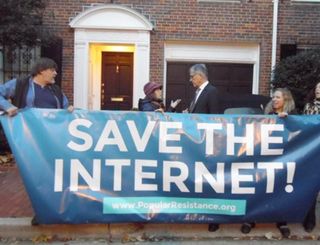The President’s New ‘Deal’

FCC chairman Tom Wheeler was heading to work to meet with public interest groups over new network neutrality rules last Monday morning, but before he could even put the car in neutral, he was faced with pro-Title II demonstrators blocking his car and chanting his name.
That was only the first instance of someone blocking his way.
On the same day, Wheeler received as close to a set of marching orders as independent agencies usually get, courtesy of President Obama, who suggested strongly that Title II is needed to prevent paid prioritization and protect an open Internet. The President took to the Internet in a video outlining a Title II plan, saying it should be Wheeler’s as well. The word was not exactly a surprise—the White House had advised the chairman the week before that the bombshell was coming, according to a commission source.
“I can’t imagine that either commissioner [Jessica] Rosenworcel or [Mignon] Clyburn will be willing to vote for anything less than Title II,” said one Open Internet activist who asked not to be identified. “If they have to choose between the president and Tom Wheeler, they will choose the President.”
By early last week, it looked like the commission was not going to take any action on net neutrality before 2015 at the earliest, that a Republican-controlled Congress was likely to be hammering Wheeler during that process and that Title II was gaining even more traction, much to the chagrin of Internet service providers.
While that will give cable and telco lobbyists more time to make their cases against Title II, they have the President’s thumb squarely on the other side of the scale.
The FCC is an independent agency, which the President acknowledged (and the chairman pointed out in response to the video), but Wheeler was tech advisor for Obama’s transition team and appears to share the President’s opposition to paid priority.
Broadcasting & Cable Newsletter
The smarter way to stay on top of broadcasting and cable industry. Sign up below
Wheeler said he would take the President’s plan under advisement and make it part of the record, but added that he agreed with its basic themes and would need time to figure out the best way to accomplish it in regulation. And the Democrats on the commission now know that a vote for anything without Title II attached is essentially a vote against Obama.
ISPs were already facing what is likely now an uphill battle to prevent the FCC from applying some hybrid form of Title II to Internet access service in new network neutrality rules.
The recent hybrid proposal—which inspired ISPs big guns in response to the simple invocation of the name Title II—is now looking more like the compromise position.
“With the President to the left of the chairman on the issue, and Silicon Valley screaming for no paid priority, a Title II hybrid may be the new middle ground,” said a veteran D.C. attorney, “though not middle enough for eitherside.”
Contributing editor John Eggerton has been an editor and/or writer on media regulation, legislation and policy for over four decades, including covering the FCC, FTC, Congress, the major media trade associations, and the federal courts. In addition to Multichannel News and Broadcasting + Cable, his work has appeared in Radio World, TV Technology, TV Fax, This Week in Consumer Electronics, Variety and the Encyclopedia Britannica.

